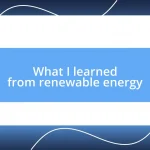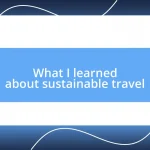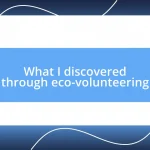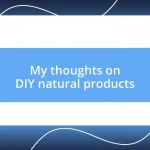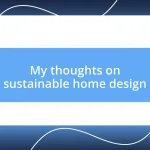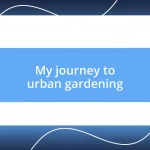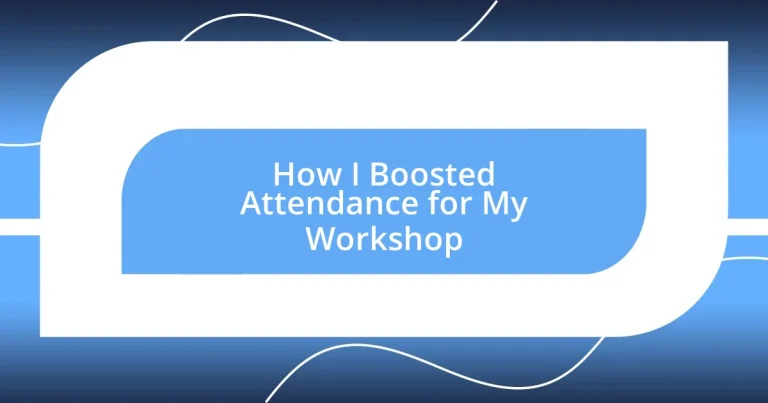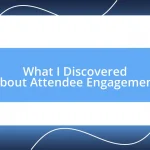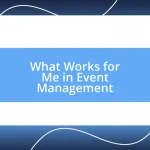Key takeaways:
- Setting clear, personalized workshop goals and aligning them with participants’ needs enhances their experience and boosts engagement.
- Understanding the target audience through surveys and feedback allows for tailored content, better marketing, and increased attendance.
- Post-workshop follow-up, including personal gratitude and ongoing discussion, fosters community and reinforces learning, creating lasting connections with participants.
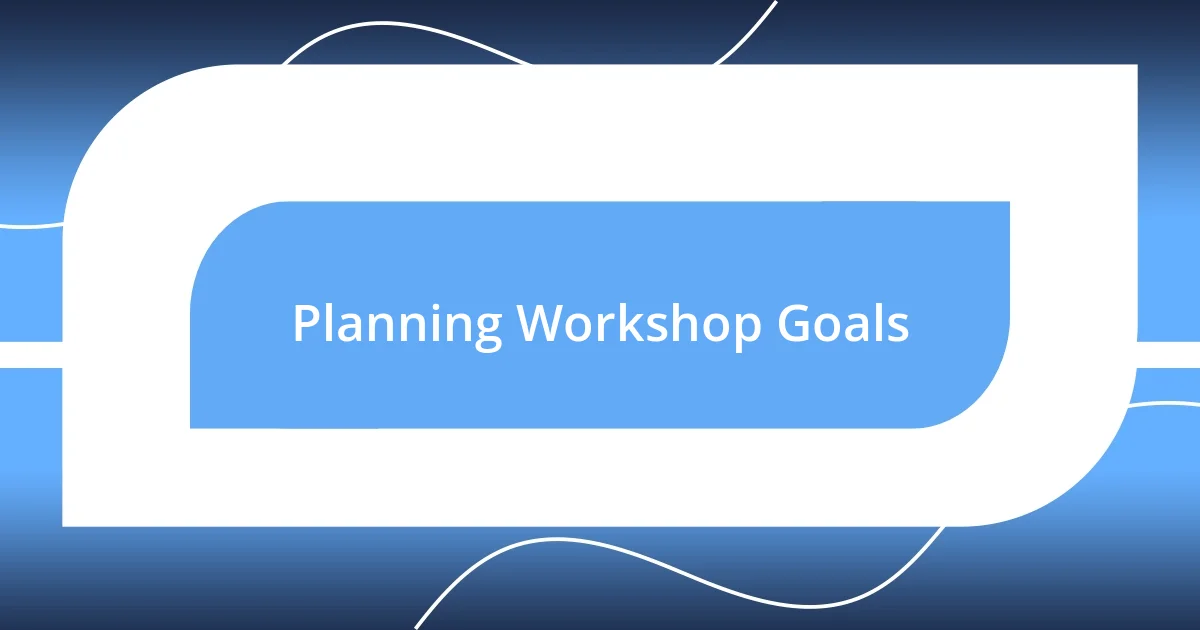
Planning Workshop Goals
When I set out to plan my workshop goals, I started by asking myself, “What do I truly want participants to take away from this experience?” This reflective process helped me focus not just on the content but on the transformative journey I wanted to create for them. A clear goal, like enhancing their skills or boosting their confidence, can really drive the entire workshop’s design.
In my experience, aligning goals with participants’ needs is crucial. During one workshop, I noticed that many attendees were anxious about public speaking. By incorporating specific activities aimed at addressing this fear, I could feel the energy shift as their confidence grew. It’s incredibly rewarding to witness that breakthrough moment when a participant realizes they can overcome their challenges.
I’ve found that writing down my goals and visualizing the successful outcomes makes a world of difference. Listing them out not only keeps me accountable but also serves as a motivational tool. Have you ever felt that rush when you tick something off your list? That sense of accomplishment can really fuel the creation of a workshop that resonates deeply with attendees.
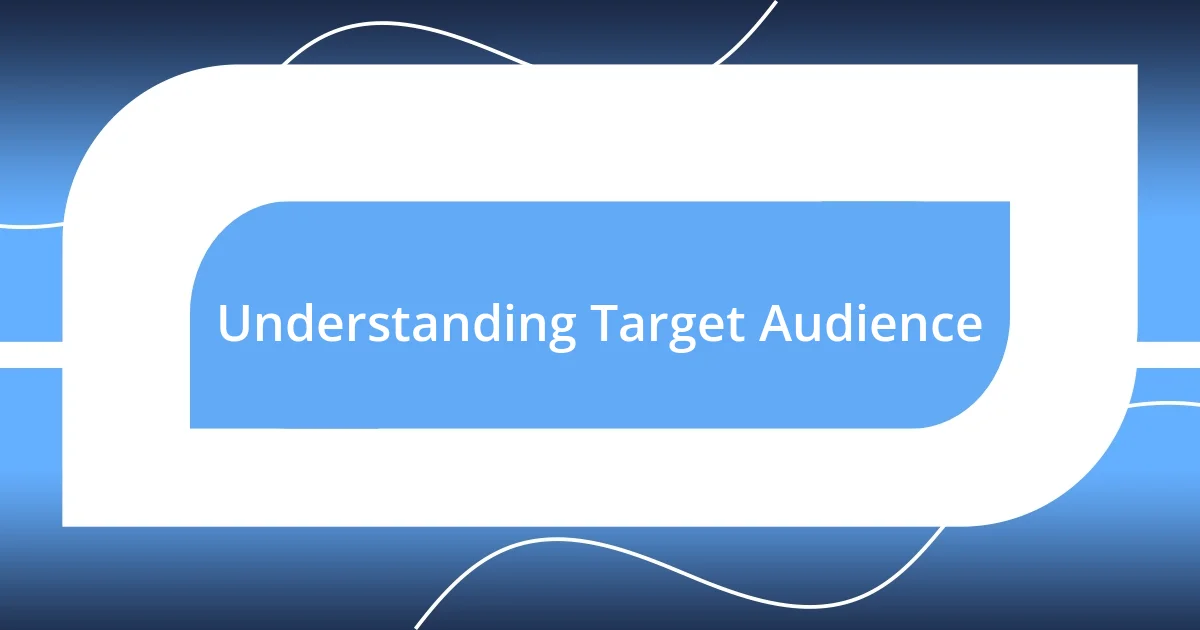
Understanding Target Audience
Understanding your target audience is essential for crafting an impactful workshop. When I first started, I assumed everyone had the same needs, but I quickly discovered this was a misconception. For instance, during one of my workshops, I surveyed attendees ahead of time and learned that many were balancing full-time jobs and family responsibilities, which required me to adjust the schedule and content to better fit their lifestyles.
I remember receiving feedback from a participant who felt the topics were ideal but wished for more interactive sessions. This insight led me to incorporate hands-on activities into future workshops, which not only increased engagement but also created a sense of community among attendees. Understanding their preferences helped me refine my approach, ultimately resulting in higher turnout and greater satisfaction.
Moreover, identifying the demographics of my audience allowed me to tailor my marketing efforts effectively. For example, recognizing that a large portion of my audience was young professionals enabled me to use platforms like Instagram to announce my workshops. This approach resonated with their lifestyle, significantly boosting attendance.
| Aspect | New Approach |
|---|---|
| Audience Understanding | Surveys and Feedback |
| Engagement Strategy | Hands-on Activities for Interaction |
| Marketing Channels | Utilizing Social Media |
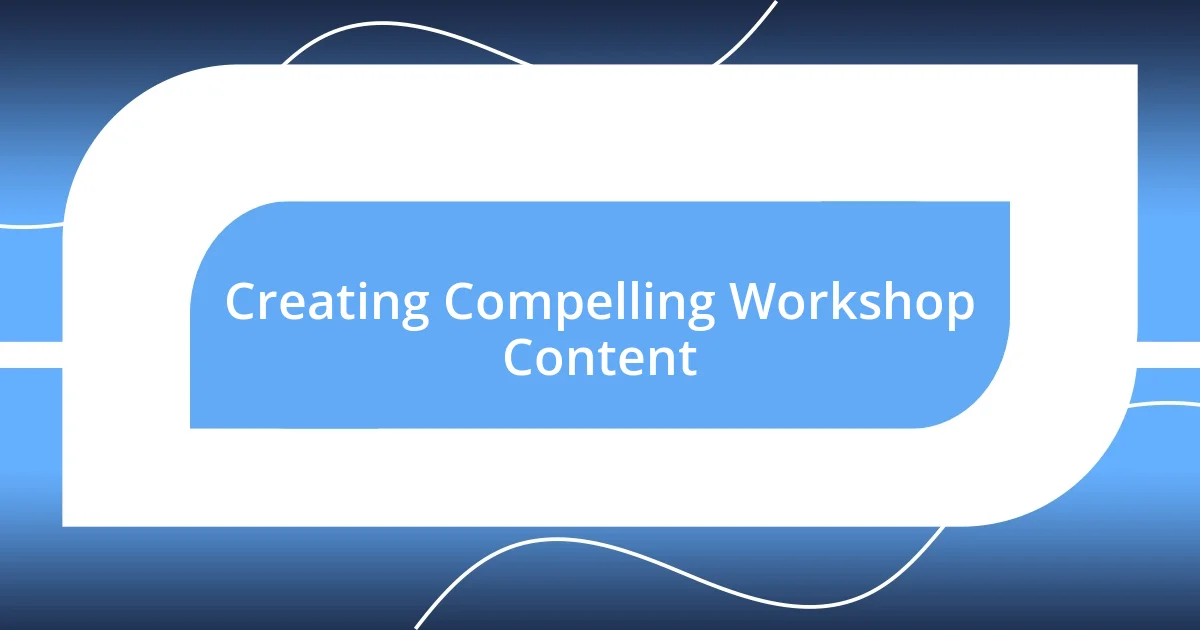
Creating Compelling Workshop Content
Creating compelling workshop content is where the magic truly happens. I’ve always believed that workshop material should do more than just inform; it should inspire. One of my favorite experiences was developing a session focused on creativity. I incorporated real-world examples that participants could relate to, and suddenly, the room buzzed with excitement. It was a thrill to see them grasp the material and start brainstorming their ideas.
To ensure the content really resonates, I recommend considering a few key elements:
– Storytelling: I love weaving personal experiences into my presentations; stories stick with people longer than simple facts.
– Engagement: Use polls or open discussions to involve participants actively. I’ve seen quiet attendees flourish in these settings.
– Practical Application: Offer scenarios or case studies that encourage participants to think about how they can apply what they’ve learned.
– Visual Aids: I can’t stress enough the impact of good visuals. They grab attention and help clarify complex ideas.
These components help create a rich learning environment where participants feel connected and motivated to dive deeper.
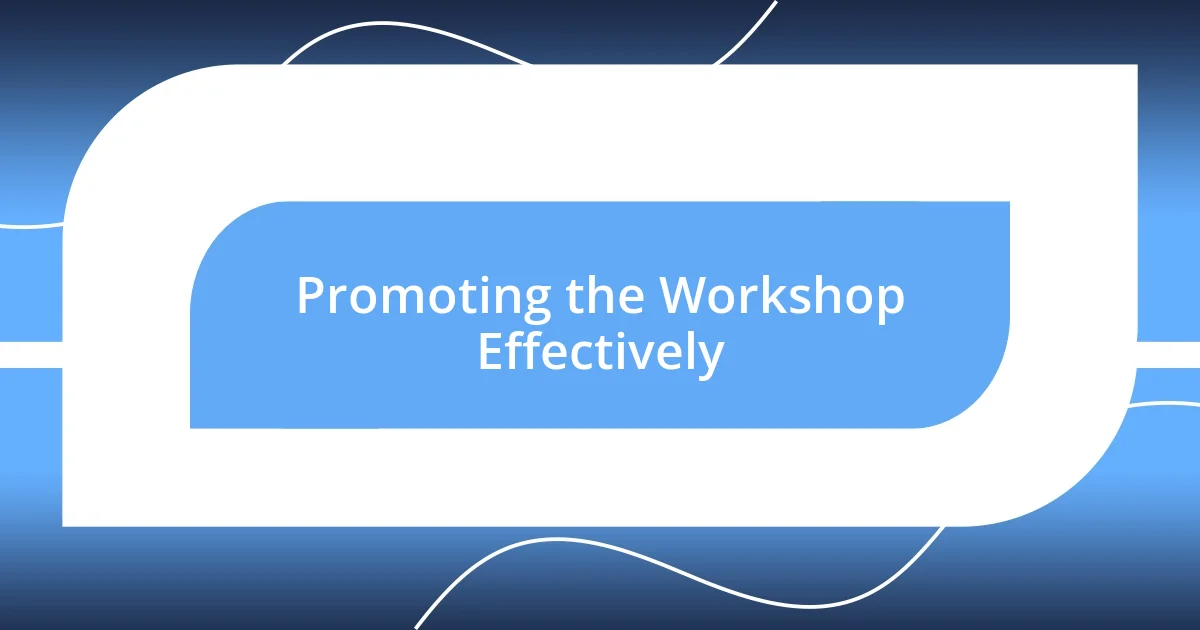
Promoting the Workshop Effectively
Promoting a workshop effectively means meeting your audience where they are, both physically and digitally. I recall one time when I decided to explore local community bulletin boards, coffee shops, and libraries to share flyers. It was surprising to see how many people appreciated the personal touch of a little paper invite stuck to a pinboard! Sometimes, it’s the simple things, like tapping into the local vibe that can amplify your reach.
Social media is a game changer, too. I remember creating a short video teaser for my workshop—something authentic, showing behind-the-scenes snippets of what to expect. The engagement shot up, and it felt like I was inviting followers into my world. Have you noticed how much more relatable a personal story can be compared to a standard promotional post? It creates a sense of connection that plain text simply can’t achieve.
Another strategy that worked wonders for me was collaborating with local influencers or organizations. I reached out to a popular local blog that aligned with my workshop theme, which resulted in them sharing my event with their audience. Have you ever considered how powerful existing communities can be? By tapping into their established trust, I saw my registration numbers rise substantially! It’s all about fostering those relationships to broaden your outreach.
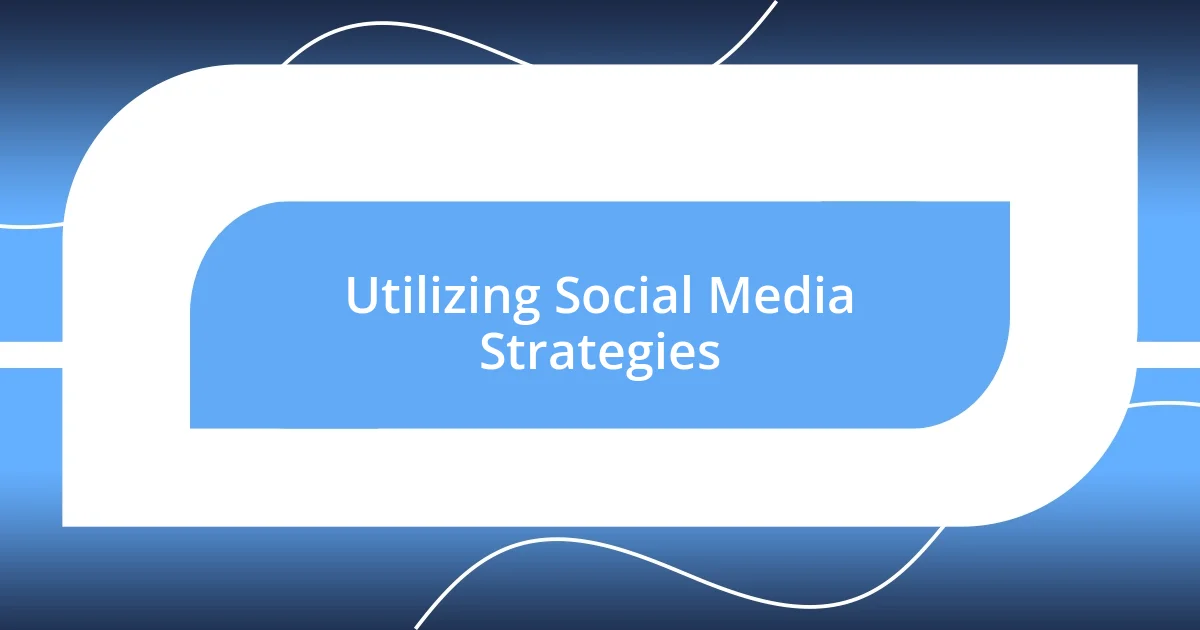
Utilizing Social Media Strategies
Utilizing social media strategies has completely transformed my approach to increasing workshop attendance. I vividly remember when I decided to engage my audience on Instagram by sharing not just promotional posts, but also snippets of my preparation and thoughts behind the workshop. It felt like inviting them into my creative process. Have you ever tried sharing your excitement and insights online? The response was incredible, with comments flooding in from curious followers eager to learn more.
In addition to posts, I found that creating event-specific hashtags was a game-changer. I crafted a catchy hashtag that encouraged participants to share their thoughts and excitement before and after the workshop. Watching the posts roll in made my heart swell—people were sharing their anticipation! I can’t stress enough how this builds an online community. Have you noticed how powerful peer recognition can be in encouraging attendance? When potential participants see their friends or colleagues engaging, it becomes a compelling reason for them to join in.
I also leveraged Facebook groups related to my workshop theme. Joining these communities allowed me to directly connect with people who were genuinely interested in the subject matter. I shared valuable tips and relevant content, positioning myself as a helpful resource. When I posted about my upcoming workshop, it felt like a natural extension of our conversations. By participating actively, I didn’t just promote an event; I built trust and rapport. Is there any better way to attract attendees than through genuine relationships? In my experience, that’s where the real magic happens.
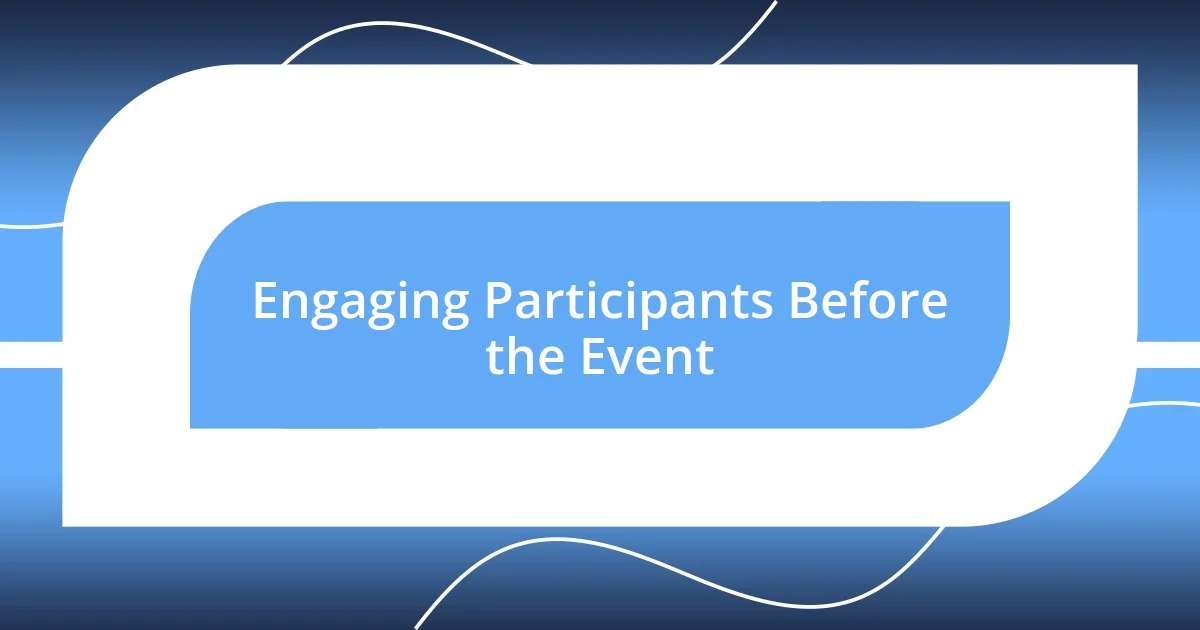
Engaging Participants Before the Event
Before the event, I focused on creating a sense of community among my potential participants. I initiated a private group chat for everyone who expressed interest, and what a delightful experience that was! The conversations flowed, with attendees sharing their thoughts and ideas even before the workshop started. Have you ever seen how quickly excitement builds when people interact? It was incredible to witness that dynamic in action, fostering an environment where everyone felt welcomed and eager to participate.
I also made it a point to send out engaging and personalized emails leading up to the workshop. Instead of standard reminders, I included questions and prompts that encouraged recipients to reflect on what they wanted to learn. It was rewarding to see many respond with their insights, and I felt an instant connection to their expectations. How often do you think participants appreciate being invited to contribute their thoughts before an event? I know for me, it made them feel valued, which surely translated into greater enthusiasm for attending.
Finally, I decided to host a countdown on my social media profiles, sharing little tips and fun facts related to the workshop theme each day. This not only kept the event on everyone’s radar but also sparked conversations among followers. It felt like I was turning the countdown into a community event in itself. Have you noticed how a simple countdown can build anticipation? It certainly worked wonders for my workshop attendance! Seeing the engagement boost with each post reaffirmed how vital pre-event interaction is.
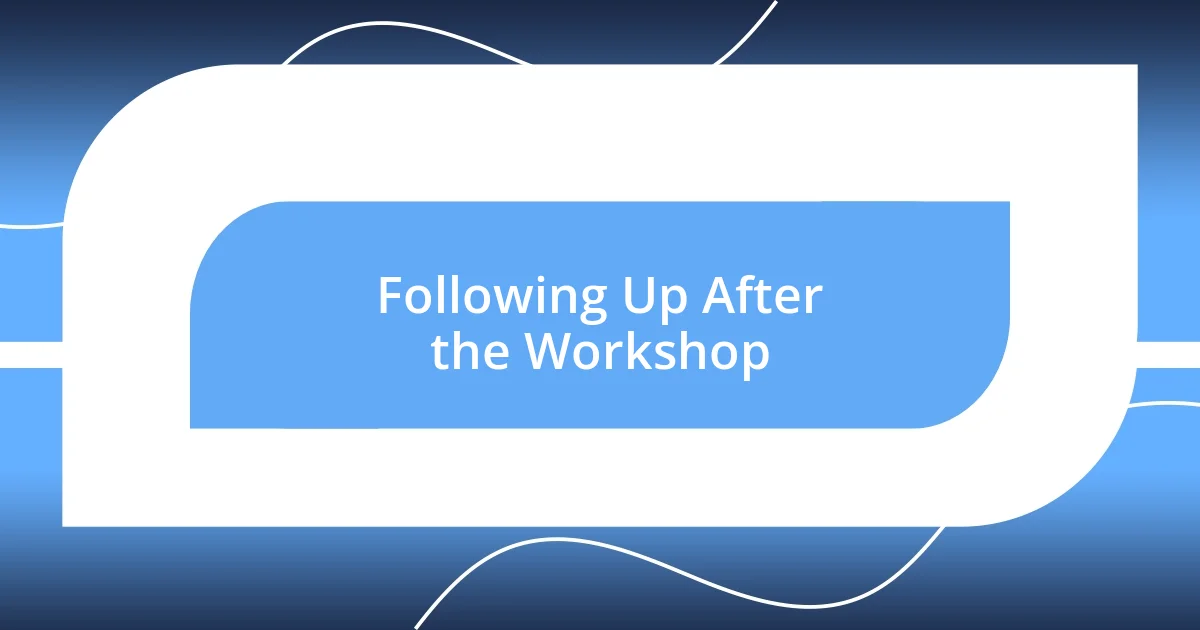
Following Up After the Workshop
After the workshop, I made it a priority to follow up with attendees to express my gratitude. I crafted personalized thank-you emails that not only acknowledged their participation but also invited them to share their thoughts on the experience. It felt fulfilling to connect post-event; I remember one attendee shared how a specific activity really resonated with them. Isn’t it amazing how those little moments can leave a lasting impact?
Engaging with participants after the workshop also meant creating a space for ongoing discussion. I opened up a feedback channel, encouraging them to share more insights or even questions they didn’t get to ask during the session. This made me feel that the workshop wasn’t just a one-off event; rather, it was a starting point for continuous learning. Have you ever felt empowered when advice or feedback is welcomed even after the fact? It’s a game-changer.
Lastly, I took the initiative to share a summary of the workshop, complete with key takeaways and additional resources in a follow-up newsletter. Knowing that participants had something tangible to refer back to was satisfying. The feedback I received made it clear that attendees appreciated having a resource they could revisit. It’s moments like this that remind me: do you think the connections we create during these events can extend well beyond the workshop? I certainly believe so!




